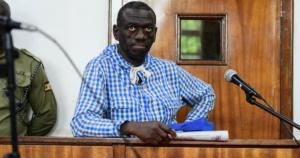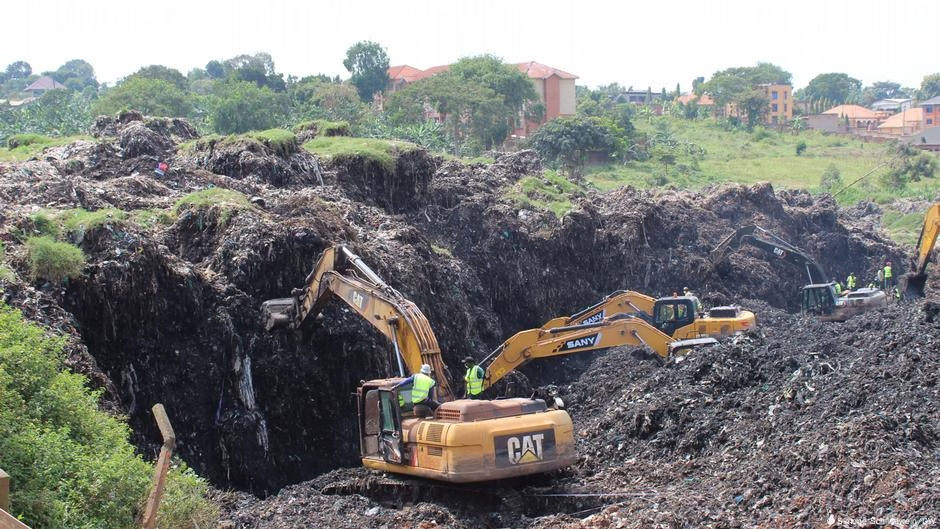Zamhall Nansamba stands in front of her house in Kiteezi, a suburb of Uganda’s capital Kampala, with her one-year-old son in her arms. Flies swarm around her, and the smell of garbage fills the air. Her flip-flops keep her feet just above the muddy dirt floor.
One year ago, on August 9, 2024, an avalanche of rubbish from the adjacent landfill almost buried Nansamba’s family and her home.
The mother of two says she was extremely lucky: “I got up early that morning to do the housework,” she recalls.
“When I heard a noise, I went outside. I saw the trees and the rubbish coming.” Her lips tremble as she recounts, “I grabbed my two children and we ran.”
The 31-year-old points up at a huge mountain of waste – Kampala’s municipal landfill – towering above her detached house. In 2024, tons of waste thundered down the slope and buried more than 70 houses. Thirty-four bodies were recovered, and more than 20 people are still missing. More than 220 residents were left homeless. Later, officials said a methane explosion triggered the landslide.
That day completely changed Nansamba’s family’s life. When she returned to see if her house was still standing, she found the building intact, but many others destroyed, and the cows in the neighboring meadow were all dead.
“Some of the people lost their property, lost their lives,” she tells DW. “Until now, we are living a miserable life. We had rental apartments down there, and I was able to pay my children’s school fees with the income from those apartments.”
Japanese help
Immediately after the disaster, the Kampala Capital City Authority (KCCA) told residents living near the landslide to move because the landfill could slide further. But families like Nansamba’s, who live in this poor neighborhood on the northern outskirts of Kampala, have no money to settle elsewhere.
Fear of another potential avalanche keeps her awake at night, Nansamba says. Her husband is undergoing psychiatric treatment.
“We are all traumatized,” she tells DW.
Immediately after the landslide, the KCCA closed the landfill in Kiteezi, where all the waste from the two-million-strong metropolis has been piling up unsorted for over 27 years.
City spokesperson Daniel Nuweabine told DW that the Japanese government recently provided $1 million in funding to secure the landfill, flying in machinery and Japanese engineers. Work included compressing about 500,000 tones of waste.
“This is a huge task. These are high-risk areas where methane gas is present in the ground and the pressure can open cracks and easily trigger further avalanches,” says Nuweabine.
The Kiteezi landfill is now officially closed. But where do the 2,000 tonnes of waste go that Kampala produces daily?
Nuweabine says in March, the KCCA bought 90 hectares of land in Buyala, 27 kilometers west of Kampala, to build a new landfill.
The municipality has big plans for processing the city’s waste, the spokesperson said, which includes a composting project to create biogas. An estimated 80% of household trash is compostable biowaste, because Kampala residents rarely use processed food. The rest could be recycled, Nuweabine says.
Controversial land issue
But so far, the idea lacks investors and funding. Unsorted waste is still being dumped in Buyala, which remains controversial, according to Aldon Walukamba, spokesperson for Uganda’s National Forestry Authority.
“To our knowledge, this is still a forest reserve,” Walukamba tells DW. “It is located in the catchment area of the Mayanja River, a key contributor to Lake Victoria and its biodiversity ecosystem.”
“We found that indeed some garbage had been dumped,” said Walukamba.
When he went there himself in December 2024, soldiers and police officers were on site.
The controversy has sparked several court cases. The KCCA insists the land near Buyala, where garbage is now being dumped, belonged to two private individuals from whom KCCA legally acquired the land in March.
This article was originally published in German.
Source: https://www.dw.com/en/uganda-still-battling-waste-disaster-one-year-on/a-73561936?maca=en-rss-en-all-1573-rdf






